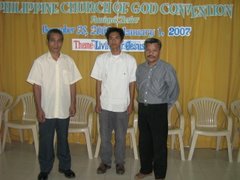PRACTICAL THOUGHTS ON PREACHING - J. GRANT ANDERSON
FIFTEEN YEARS of active service in the ministry of the Church of God has not failed to teach me some valuable lessons, a few of which I submit for your consideration, especially to those who areyounger in point of service than myself. God has chosenus to fill the highest calling in life. There is no other career that can compare with the ministry in the rich and satisfying relations into which it brings a man with his fellowmen, in the deep insight it gives into humannature, and also the chance of improving our own Christian character. The study of God’s love, of His workmanship and in nature, leads us into ever widening channels. Its delights never grow old; its interests never wane; its stimulus is never exhausted. Some of the following suggestions have been learned from sad experience, some from kindly admonitions, some from failures, some from successes, and some from hard study. I shall try to pass on to you those that have been especially beneficial to me.
THE PURPOSE OF PREACHING
Never for one moment should we forget the solemn fact that we are messengers sent by the almighty God, with a message to a lost and fallen humanity who are tottering on the brink of eternal night and despair. We do not preach to show our skill or range of education, but like successful Paul we preach, “Not ourselves, but Christ crucified.” Who has not seen a man struggle to make a wonderful impression, but who notwithstanding the energy expended and the range and breadth of subject covered, face a restless and unconcerned congregation? Who has not seen such a “great discourse” followed by a talk from an awkward exhorter, who without discipline of mind, or knowledge of pulpit manners, climaxes or elocution, held the listeners spellbound; and all were sorry when he sat down? Wherein lies the difference? The former effort was a splendid treatise on the philosophy of the plan of salvation, and in an abstract way held up Christ before the people. The latter was a message of love and encouragement from our Father to the hungry souls of men. The former preached the ideal; the latter, the living Christ. The greatness of a sermon does not consist in its wide scope of relative matter covered, nor the cleverness of its delivery, but in its power to magnify Christ, to teach man his true relation to God, nature, humanity and duty. Remember then, the purpose of preaching should not be lost sight of, even for a moment, for it determines its character. It will cause one to think soberly when he considers carefully what the object of preaching really is. If the object of preaching is simply to make social conditions better, then lecture upon social science. If it is simply to save men from future punishment, lecture upon economy. If salvation is still in the future and no risk is being run in delay, then whisper softly and soothingly. But if salvation is present, now or never, if it comprehends power to break away from sin, and to live a holy life, if it is a fact that to die in sin is to be lost to God, to the pure and the blest, to all things lovable and desirable while eternal ages roll on and on, we should exert every energy, husband every resource, take advantage of every opportunity, and spend our whole time in active preaching with the burden of lost souls ever upon our hearts. Again, preparation for the ministry that does not have for its major object the bettering, enriching and widening of the moral and Christian character in the minister himself, is apt to cloud the mind as to what and of what a real sermon consists. A candidate for the ministry given only mental and ethical training judges sermons by some human standard of judgment. The good sermon is the one that accomplishes the end sought. One minister worries all the week because he cannot find a sermon that he thinks would be suitable for the following Sunday. That is an index of the lack of the rich graces of God, and shows a limited knowledge of what true preaching really consists. Asecond minister studies all week because he is expected to preach the following Sunday. He does better than thefirst because he does put forth some personal effort in gathering facts and truths, but his efforts show he does not fully understand the purpose of preaching, for he prepares because his congregation expects him to preach. A third is also engaged in study all the week; but his object is to gather truth, to interpret God’s will, and thus to enrich his own soul and enlarge his vision relative to the needs of his fellowmen. He has been storing away in his mental and moral nature a mine of wealth, of deepconsideration, of personal duty, of appreciation of God’s goodness, and this has resulted in deeper love and a broader view of life. Knowing the strong and the weak points of his flock, he does not lack for a message. He steps before them on Sunday morning in possession of a certain richness which they soon detect and which they will strive to obtain. He does not think so much of his sermon as he does of the message that is burning in his heart. His presence and words invite them—“Follow me as I have followed Christ.”
EDUCATION A VALUABLE ASSET
God can use a man if his vocabulary consists of fifty words, but He could use him in a wider sphere if he could use one hundred and fifty words. The minister who is lazy, or who has learned to sneer at “book learning,” is foredoomed to either failure or a narrow field of labor. The church is today face to face with tremendous problems—problems that must be solved—such as a well-balanced attitude relative to church government, matters of conscience, finance, doctrine and of methods of defense with increase of liberty. Increase of knowledge brings an increase of dangers. Religious imitators from without, and from within, those whose conscience will allow almost any act, need attention from men who are capable of careful analysis. To be able to successfully combat the educated religious rickster (Gift of Tongues Movement, Latter-day Saints, Spiritualists, Nazarenes, Christian Science, etc.), a minister must know some things thoroughly and be able to set them forth clearly, not only in a Christian spirit, but logically and systematically. Our greatest danger, however, is from within. On this side we shall have to combat too much liberty of conscience in matters of dress; private interpretations upon certain doctrinal points; too liberal attitude toward other religious bodies; too much self in looking for centralization of power; adding too much human machinery that we weaken our power, etc., etc. We may in a Christian spirit sputter out our remonstrances to defects and but little attention will be given, but men will take off their hats and listen to a minister who has something to say and can say it well. The function of language is to convey ideas, and the better we understand how to say what we have in mind the greater will be our usefulness. Education gives at once variety and a good standing before an audience. Every hour’s study of the Bible, science, literature, language, history and philosophy, with the thought of enriching your own soul and of broadening out your mind that you may be of greater help to others, is necessary, commendable and desirable. The mower does not consider the time occupied in sharpening his sickle lost time.
MISCELLANEOUS SUGGESTIONS
Self-consciousness is a hindrance to effective preaching and should be overcome as quickly as possible. Every added power to master ourselves is an increase in efficiency. A minister who is governed by his feelings, or who is compelled to resort to artificial helps, too often gives his hearers the impression that he is weak. The minister with an undisciplined mind, or one that is super educated, labors at a disadvantage from the beginning of his discourse. He does not know how to begin, for he isaware of the power of first impressions; his mind is watching the movement of his hands, or struggling to make use of the proper word, for a grammatical error will be noticed by a certain man in the audience who has the reputation of being a critic. We pity such a speaker, but his weakness is not inherent. It comes from a lack of knowledge of himself—knowledge that persistent study alone will bring. We may attribute his lack of personal magnetism, but that is not the secret. His weakness is in his self-consciousness. That quality we do covet, called magnetism, which seems as scarce as radium, is not altogether an inherited quality, but primarily it begins to grow the day we lose sight of our sermon, our self, our hands and feet, our grammatical constructions, our rhetoric—the day we get our eyes upon God’s love to man, man’s awful danger, and the day there kindles in our heart a keen joy and appreciation of assisting mankind out of sin’s powerful grasp and of helping them to understand the true meaning of life. Paul’s great power consisted in a broad, educated mind and sympathetic heart, constrained by the power of Christ. The law of growth demands that any faculty or quality outside of duty is capable of culture and expansion. The measure of a preacher’s greatness lies in his ability to get a timely message from God, and to deliver it to hungry souls with everything else out of sight.
SOBERNESS ABSOLUTELY ESSENTIAL TO SUCCESS
Real preaching consists in handing truths which are as long and deep as eternity to souls that have an existence coequal with God. Whoever loses sight of these solemn facts is liable to introduce trash into his pulpit utterances, and thus temporarily backslide from preaching. A reallyapostolic ministry will give out from the pulpit sound, sober, sensible, earnest discourse about God, Christ, heaven, hell, immortality and eternity. To have a reputation as a pulpit clown is to limit your field of usefulness in no small degree. You may be called clever, but you will not be sought often in times of man’s deepest sorrow and anguish of heart; for, instinctively, if for no other reason, men at such times will desire the company of a more sober-minded man. Beware of joking, because it takes the keen edge off from seriousness and tears down moral fiber. Personal humor goes along with individuality and cannot be separated from the man.
COURAGE NECESSARY
This important quality does not come by deciding to be bold, for that argues egotism. We increase in courage the same as we increase in moral force—by a steady, healthy, normal growth. The thought that we are ambassadors of God, that we are dealing in eternal elements, that we are laying a foundation as firm is the throne of God, naturally begets a humble, holy boldness and courage. If we are a slave to men’s opinions, we should seek other employment.
CONCLUSION
Carefulness upon our part that we keep spiritual, and morally clean, with a passionate desire to be better and more efficient in the work into which God has called, and with which God has trusted us, will be the surest safeguard against the numerous evils and sins with which we are surrounded. The price of success in the ministry, as in any vocation, means tireless activity, eternal trueness, and an unquenchable desire to learn more of God and our fellow beings. I close with quotations from two wise men from two distinct ages: (a) “Wisdom is the principal thing; therefore get wisdom: and with all thy getting, get understanding” (Proverbs 4:7).—Solomon the King, B.C. 1000. (b) “If any of you lack wisdom, let him ask of God, that giveth to all men liberally, and upbraideth not: and it shall be given him” (James 1:5).—Apostle James, A.D. 60.
—Reprinted from August, 1975 issue



















































































































No comments:
Post a Comment